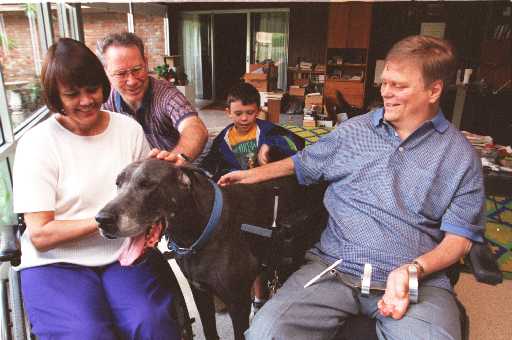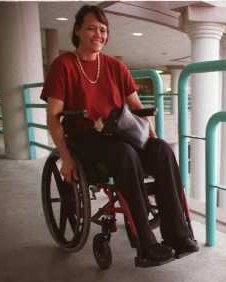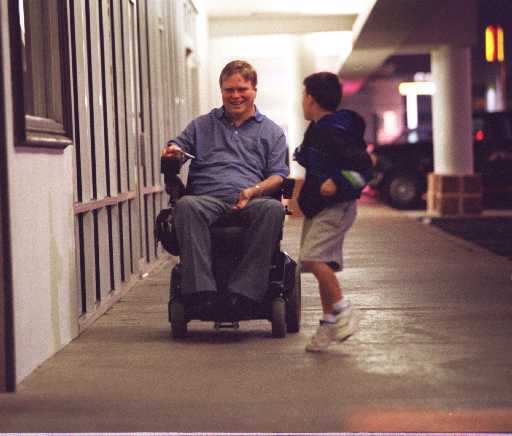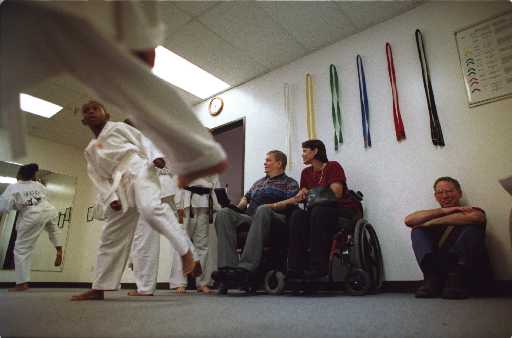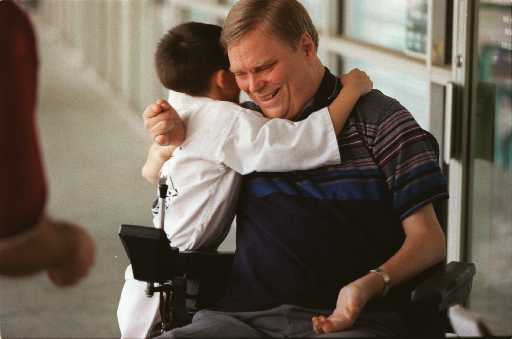|
HOUSTON CHRONICLE SUNDAY 10/25/98
LEX FRIEDEN , a chief architect of the Americans with Disabilities Act, is adamant about the ordinariness of his life. He eats microwave dinners. He procrastinates on his taxes and worries about saving for retirement. He's been married for 21 years. "We get up every morning, take our grandson to school," he said. "We have to figure out how to pay our bills. We're like an ordinary, middle-aged family." But "ordinary" in the Frieden household is, by most standards, nothing short of extraordinary. The 49-year-old Houstonian has been almost completely paralyzed since his neck was broken in a car accident 31 years ago. His wife, Joyce, is paraplegic because of a rare disease that struck her brain and spinal cord when she was a young mother. They share their home - and homemaking chores - with a longtime friend, Mac Brodie, who has no short-term memory because of a brain injury. Together, they live a life that includes working, socializing, traveling and raising a rambunctious, karate-chopping 7-year-old boy. Each fills in according to his or her abilities. Joyce Frieden can drive. Brodie helps Lex Frieden with physical tasks, like taking a shower, or getting in and out of bed. Lex Frieden helps Brodie remember where he is and what he's supposed to be doing. On Thursday, this unlikely trio will travel to Washington so Frieden can collect a $50,000 award for his work as an advocate for the disabled. "It's a very unusual family," said Justin Dart, a Texan who served five presidential appointments and helped write the disabilities act, or ADA. "Mac is one of the most unique people I've met in my entire life," he explained. He calls Joyce Frieden a "tremendous advocate" and hails Lex Frieden as "one of the great patriots of 20th-century America." The ADA, he said, "would not have passed without Lex Frieden . "He was a pioneer of independent living; he's a pioneer of rehabilitation," Dart said. "He's a real Renaissance man." Frieden zips through the halls of The Institute for Rehabilitation and Research, or TIRR, in his electric wheelchair (top speed: 6 mph), recounting patients' success stories. A former patient, Frieden now is senior vice president of the Texas Medical Center facility. He is also a professor of physical medicine and rehabilitation at Baylor College of Medicine. "Independence is kind of a relative thing," he said. He used to think it meant the ability to do things alone. Now, he finds that independence means "you can get there. Everyone has help in one form or another." Trailing behind Frieden is housemate and constant companion Brodie, a 51-year-old Vietnam vet who earned two Purple Hearts but returned from the war with a permanent mental disability. He can read, multiply and count, but he can't remember people unless he's met them several times. Once, when he woke up in Washington, Brodie asked Frieden what they were doing in Pasadena, because he could see the San Jacinto Monument outside their hotel window. Frieden reminded Brodie that he was looking at the Washington Monument. The two of them take Metro Lift, the wheelchair-accessible city buses, to work every morning. Frieden helps Brodie organize his day, making sure Brodie has a note or list in his pocket. On a recent morning, Brodie took one of his hobbies, a weaving project, to the TIRR cafeteria while Frieden made travel arrangements to Switzerland. Frieden called Brodie on his cellular phone, and told him to make a note to himself that Joyce Frieden would be picking them up for lunch at 12:30. A little before 12:30, Brodie was back in the office, ready to go. Joyce Frieden , who drives a maroon van equipped with a hydraulic lift, whisked them off to an Italian restaurant. When Lex Frieden 's neck was broken, he was a student at Oklahoma State University. Valedictorian of his high school class, Frieden 's bright future suddenly was uncertain. He found himself the recipient of unwanted pity. When he tried to transfer to Oral Roberts University, he was denied admission because he used a wheelchair. "There was a series of mind-boggling episodes," remembered Frieden . "I don't think anyone is prepared to deal with the whole series of changes that occur so rapidly in your life as they did in mine at that time." The summer after his accident, Frieden was at the HemisFair in San Antonio with a group of high school friends and his choir director. With his wheelchair parked on the sidewalk, he sipped a soft drink and discussed which exhibit they should visit next. A stranger walked by and dropped 50 cents into his cup. "I was just 18 years old and trying to cope with the results of the accident I'd had," he said. "That makes you stop and think about what society expects of you. Worst part of it was, it spoiled my Coke." Today, Frieden is considered a founder and leader of the independent living movement. As executive director of the National Council on Disability from 1984-1988, he and his staff wrote a proposal that laid the foundation for the Americans with Disabilities Act. The ADA, signed into law in 1990, was the world's first comprehensive civil rights law for the disabled, protecting them from discrimination in employment, public accommodations, transportation and telecommunications. For people like Frieden , it was an emancipation proclamation. At lunch, Frieden eats with the help of an orthosis, a metal brace that enables him to hold a pen or a fork. Joyce slices the meat on his plate and lifts his iced tea glass to his lips, as automatically as if she were doing it for herself. Brodie sits quietly, a contented smile on his face. "Although we try to live a typical life, we're not typical people. We're pretty pushy," said Joyce Frieden . "We've been places nobody thought we could go to." Lex Frieden 's unique arrangement with Brodie began in 1972 when Frieden lived in an annex of TIRR as part of an experimental housing project. Brodie, who was living in a home for mentally retarded people, volunteered to help the residents at Frieden 's place. Unaware of Brodie's disability, Frieden and his friends sent Brodie to the convenience store for a six-pack of beer. Unable to remember his errand, Brodie walked home, the $5 in his pocket unspent. Later, Frieden and Brodie became friends. Brodie's mother suggested that the two of them might be able to live on their own if they combined forces. So they rented a house together. "It was a pretty good match. One I later called a symbiosis," Frieden said. He called it "fortuitous" that they both enjoy friends, travel, the computer and music - "although Brodie is pretty well stuck on the Beach Boys."
Soon after, Frieden met Joyce Nelson. They had seen each other around the University of Houston campus, where he was taking graduate classes and she was an undergrad. They didn't speak until they saw each other at a meeting to organize a coalition of disabled people. Losing the use of her legs three years before they met, Joyce Frieden , said she had planned to find a partner who was not disabled, someone who could help solve practical problems, like getting over curbs.
But along came Lex Frieden. "I've always been attracted by brains," she said. "I figured, between the two of us, we could figure out a way around any problems that might occur." In 1977, they eloped and had their ceremony performed in front of the Jefferson Memorial in Washington. Wedding photos were shot by a passing tourist. When Joyce Frieden moved in, the three of them adjusted easily to the arrangement. Having been in college, "the dorm concept wasn't really that foreign," she said. Brodie had no problem with it, either. "Mac, in general - it may be a part of his disability - wherever he is, he has no point of reference. So it doesn't seem to be a surprise or a worry, ever," she said. Lex Frieden agreed. "Mac doesn't have many bad memories, and he has some good memories," he said. The three of them live in a southwest Houston house that, except for a few miniramps over doorsills, hasn't been remodeled for wheelchair users. Modifications are expensive. They chose the house because its oversized rooms make it easier for two wheelchairs to pass. They don't have a cook, daily housekeeper or helpers, other than "Governor," a 165-pound Great Dane. Receipts, letters, scrapbooks and other items cover counters and tables. When you can't reach cabinets, it's harder to put things away, Joyce Frieden explains. To wash dishes, she reaches up and over into a standard-height sink. (For the sake of convenience, they usually eat out.) To bathe, she transfers herself from her wheelchair to a shower chair in the bathtub. Brodie helps Lex Frieden do the same. Brodie has a room down the hall from the Friedens' bedroom. A family portrait, taken in 1984, hangs on the wall: Lex , Joyce and Mac. The periphery of Brodie's room is piled with his art supplies, skeins of yarn and a small loom. Lex Frieden surveyed the mess and said, "I don't know, Brodie. I don't think you'd pass a Naval inspection today." Four years ago, they added another member to the family: Trey O'Connor, now 7, the son of Joyce Frieden 's daughter from a previous marriage.
"We had been taking care of nieces and nephews," Joyce Frieden said. "It just didn't seem foreign to us. We had been taking care of Trey as grandparents." She admits, however, that she had to find ways to help him burn off energy, enrolling him in soccer, karate, scouts and gymnastics.
On Mondays, Joyce Frieden takes Trey to tae kwan do lessons. Wednesdays, she reads to kindergartners at his school. Between stories, she answers questions that range from "Will you walk again?" to "Can you really feel it if I hit your toe?" She said she volunteers at the school because she wants kids to see that it's OK to use a wheelchair. That way, if they ever wind up in one, they'll have an easier time adjusting than she did. She's also making herself a familiar presence at Trey's school "so they can ask me questions rather than bother him with them."
Past recipients of the Henry B. Betts Award for disability advocates have invited between 100 and 600 guests to their receptions. When organizers asked Lex Frieden how many invitations he would need, they were a little stunned when he said to put him down for 1,000. That's because he wants to be sure he's not leaving anyone out. He's inviting former President Bush, who nominated him for the honor and listened to his initial proposal for the ADA. There's also a guy he used to go fishing with. He's inviting his 73-year-old choir director from Alva, Okla., who took Frieden and a station wagon-load of boys to Acapulco after Frieden broke his neck. Everyone, in short, who enabled him to lead an extraordinarily ordinary life. Asked what Frieden is going to do with his $50,000 cash prize, he said it'll be nothing unusual. Something for the house, maybe. Probably a wheelchair-accessible shower.
Copyright notice: This article is copyrighted by Houston Chronicle Publishing Company Division, Hearst Newspapers Partnership, L.P., or its news and feature syndicates and wire services. No materials may be directly or indirectly published, broadcast rewritten for broadcast or publication or redistributed in any medium. Neither these materials nor any portion thereof may be stored in a computer except for personal and non-commercial use. |
